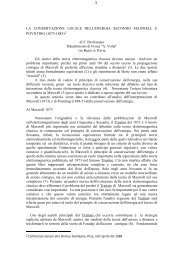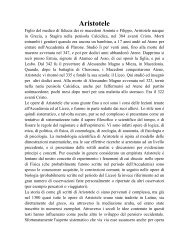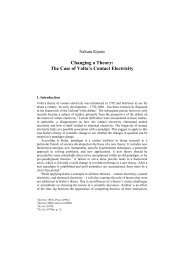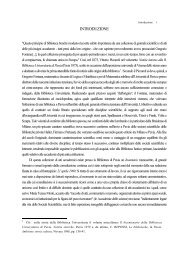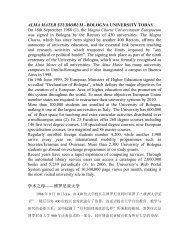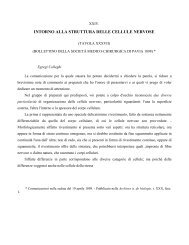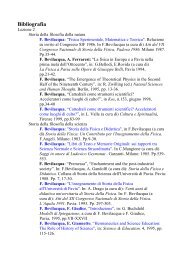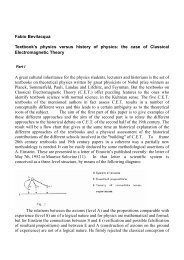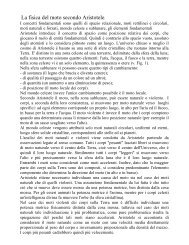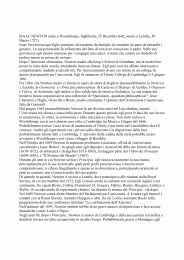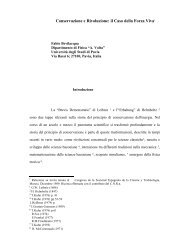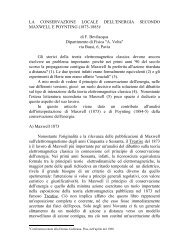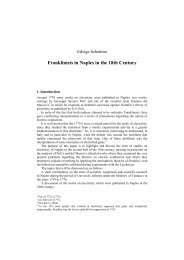Conservation and Innovation : Helmholtz's Struggle with Energy ...
Conservation and Innovation : Helmholtz's Struggle with Energy ...
Conservation and Innovation : Helmholtz's Struggle with Energy ...
Create successful ePaper yourself
Turn your PDF publications into a flip-book with our unique Google optimized e-Paper software.
term derives from a sociological debate 448 challenging the "priority" approach 449.<br />
Kuhn, adopting this sociological perspective, is obliged to identify different<br />
statements of the pioneers 450 <strong>with</strong> a "simultaneous discovery", despite some<br />
explicit difficulties <strong>with</strong> a stricter historical perspective 451. Paradoxically he gives,<br />
against his own basic historiographical claims 452, a Whiggish explanation 453.<br />
Whatsmore in so doing, <strong>and</strong> here we deal <strong>with</strong> the second historiographical<br />
problem, he adopts a concept of energy that has substantialistic tones 454 <strong>and</strong> that<br />
is by no means shared contemporary physical knowledge 455. Nowhere in the<br />
paper can be found an explicit definition of "energy conservation", a rather<br />
serious weakness, shared by the great majority of the contemporary secondary<br />
448 "the main objective" of the paper is the preliminary identification of the sources of<br />
this phenomenon. Kuhn Sim Disc p.70. Elkana, Yehuda. "The <strong>Conservation</strong> of <strong>Energy</strong>: A case<br />
of Simultaneous Discovery?" In Arch Int Hist Sci 24 (1970): 31-60. Pp 36-7.<br />
449 Kuhn Sim Disc n.8, p.72. See also: Cantor "Locating" p. 1.<br />
450 "no two of our men even said the same thing". Kuhn Sim Disc p.70.<br />
451 "Even to the historian acquainted <strong>with</strong> the concepts of energy conservation, the<br />
pioneers do not all communicate the same thing.", <strong>and</strong> " What we see in their works is not<br />
really the simultaneous discovery of energy conservation". Kuhn Sim Disc p.72.<br />
452 Against the scientist-historians who "retrieved the current contents of the specialty<br />
from past texts of a variety of heterogeneous fields, not noticing that the tradition they<br />
constructed in the process had never existed. In addition, they usually treated concepts <strong>and</strong><br />
theories of the past as imperfect approximations to those in current use, thus disguising both<br />
the structure <strong>and</strong> integrity of past scientific traditions." Kuhn, Thomas. "The Relations<br />
between History <strong>and</strong> the History of Science." In Daedalus 100 (1971) : 271-304. Rep. in Kuhn<br />
Ess Tension. Pp. 127-161. P.149. Kuhn himself warns against the "inappropriateness of our<br />
concept of discovery", as remembered by Cantor Locating p.2. See Kuhn, Thomas. "The<br />
Historical Structure of Scientific Discovery." In Science 136 (1962) :760-64. Rep. in Kuhn Ess<br />
Tension. Pp 165-77.<br />
453 "Only in view of what happened later can we say that all these partial statements<br />
even deal <strong>with</strong> the same aspect of nature". Kuhn Sim Disc p.70.<br />
454 "We know why these elements were there: <strong>Energy</strong> is conserved; nature behaves<br />
that way". Ibid. p.72.<br />
455 "It is important to realize that in Physics today, we have no knowledge of what<br />
energy is.". Feynman, Richard. The Feynman's Lectures on Physics. 3 vols. Addison Wesley,<br />
1963. Vol.1, chapt.4, par 4.1, p.4.2.



